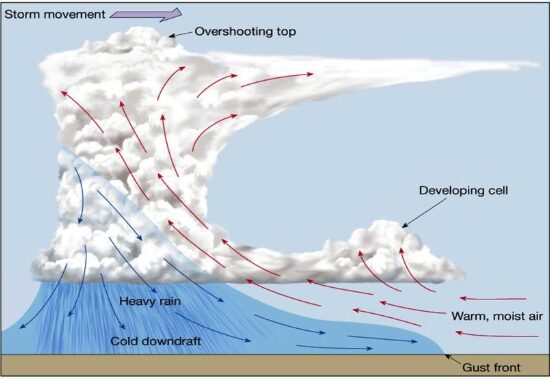Thunderstorms are common in Oman, especially in summertime when the local convection is active. The structure of such storms helps to witness a drop in the air temperature. The thunderstorms can be divided into two parts in terms of the airflow which are the inflow (updraught) and the outflow (downdraught). The downdraught is associated with cold air and this part is also known as the cold pool as shown in the schematic below.

Such phenomenon affects the air temperature in different ways, and the two common ways are the following:
Solar radiation blockage
The cloud cover of the thunderstorm is known for its thickness and cloud droplets density, by which it can block the heating source effectively and reflects the shortwave radiation back to the upper atmosphere. However, the blockage itself will not change the temperature significantly because the air is a poor conductor.
cold pool or cold downdraught
The downdraught is known for the cold airmass which can noticeably decrease the temperature because such dynamic will release the warm airmass by cold airmass. The meteorological weather stations record the drop in different occasions during the active season of thunderstorms. The table below shows the temperature from some weather stations during the effect of thunderstorms.
| Date | Station | Minimum temperature (C ) |
| 16/07/2021 | Al Amerat | 25.3 |
| Bawsher | 27.1 | |
| Samail | 26 | |
| Saiq | 18 | |
| 01/08/2022 | Yanqul | 21.5 |
| Dhank | 23.6 | |
| 22/08/2022 | Dhank | 19.1 |
| 18/09/2023 | Mhadha | 23.8 |
